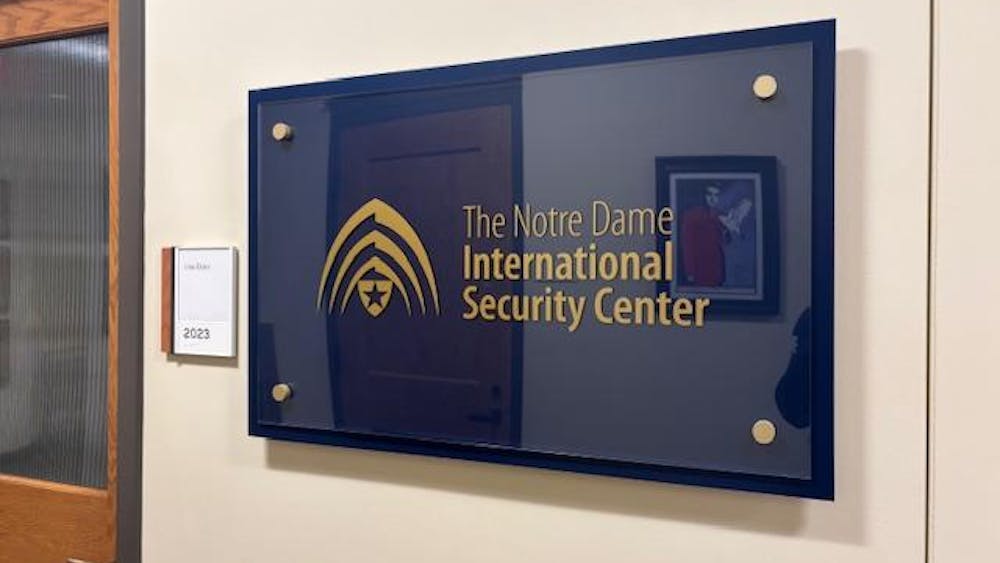The Saint Mary’s Division for Inclusion and Equity hosted a panel via Zoom on Monday to discuss some of the main tenets of the controversial critical race theory. The panelists were Saint Mary’s professors Stacy Davis, Dan Horan and Kelly Faust.
The professors set out to clearly define critical race theory and cut through the disagreement surrounding the topic. Each panelist detailed a tenet of critical race theory and argued that the ideas are important in understanding race relations in the United States.
Davis, an associate professor of religious studies and gender and women’s studies, spoke first about the idea of racism as a permanent reality in America.

Professor Daniel Horan speaks during a panel on critical race theory hosted by the Division for Inclusion and Equity on Monday.
“To argue for the permanence of racism is to argue the opposite of a phrase that we hear constantly whenever something bad happens, and it’s, ‘this is not who we are,’” Davis said.
Davis pointed to historical treatments of nonwhites in America. She said stealing land from and excluding Native Americans, Asian Americans and Latin Americans reinforces that racism “is exactly who we are.”
Though the Fourteenth Amendment granted citizenship to Black Americans, “we’re still kind of waiting on that amendment,” she said.
Police brutality, educational inequalities and many of the other difficulties faced by Black Americans are examples of how they are not treated as full citizens, she explained.
Critical race theory plays an important role in acknowledging the realities of American history, Davis said.
“It means we can stop feeling like we’re being gaslighted because every time someone says, ‘this is not who we are.’ Folks who are Black and brown can give a laundry list of reasons that this is exactly who we are,” she said.
Professor explains idea of ‘whiteness as a property’
Horan, a professor of religious studies, theology and philosophy, described critical race theory’s tenet that the social construction of “whiteness” as property in America with heavy legal and social consequences.Horan explored historical examples of whiteness being used as a means of obtaining rights and privileges in the U.S. He concluded by comparing his experiences as a white man to the case of Ahmaud Arbery, who in 2020 was shot and killed while running along a road in Brunswick, Georgia.
“This notion of whiteness as a property that is inalienable and non-transferable is something that’s identified with me,” Horan said. “I carry with me everywhere, that I am not exposed to the same threat danger or discrimination, violence or subjugation as others by virtue of this property that is whiteness.”
Professor details ‘interest convergence’ phenomenon
Faust explained how critical race theory holds that progress and reform combatting racial inequality in the U.S. exclusively occurs when white Americans also see an advantage in reforms.“Interest convergence is essentially where the interests of Blacks with regards to racial equality will only be accommodated when they converge with the interest of whites,” Faust said.
Using the progress made on desegregation as an example, Faust said desegregation aligned with the interest of whites through its advantages to its international standing.
“Desegregation allowed the United States to increase our prestige and credibility amid the struggle against communism,” she said.
Increases in support of the Black Lives Matter movement by white people following the death of George Floyd in 2020 could also be viewed as an example of interest convergence, Faust said.
“This was a point where it finally became popular or at least socially acceptable to embrace Black Lives Matter,” she said.
Critical race theory under fire
Discussing the concept’s ongoing controversial status, including a speech Saturday in which former president Donald Trump called on supporters to “lay down their very lives” in fighting critical race theory, the professors expressed frustration with common misunderstandings of the concept.“I was teaching critical race theory for a long time before this happened,” Faust said. “And now all of a sudden, I've got students that are more resistant to it than in the past. It’s really unfortunate.”
Davis said the uneasiness which critical race theory may cause by exposing the realities of racism in the U.S. — despite occasional progress on racial issues — is important.
“The reason I don't like using that type of ‘less’ language is because it suggests that you don't have to keep hustling, and you always have to keep hustling,” Davis said, referring to the idea that the U.S. has become “less racist.”









